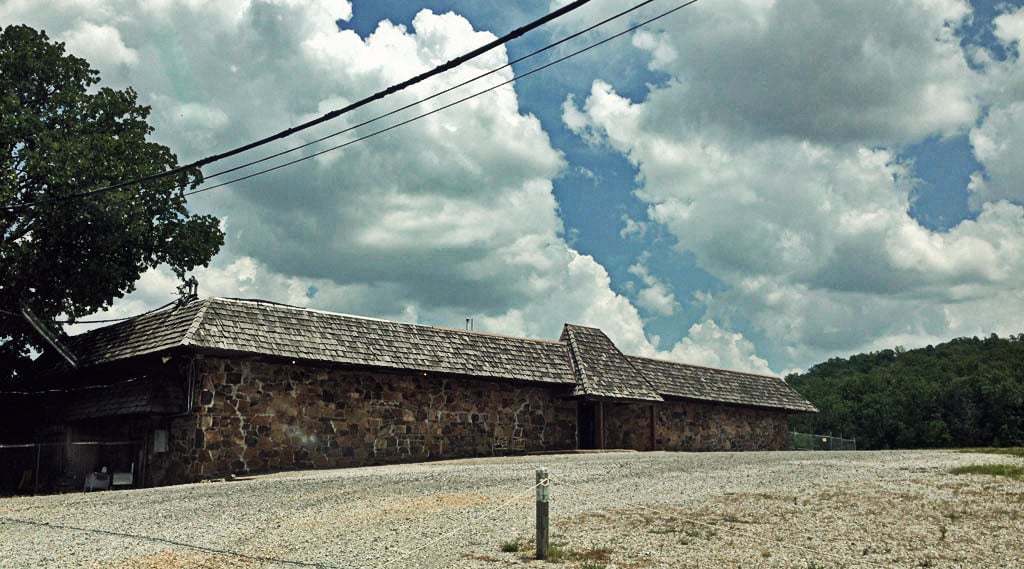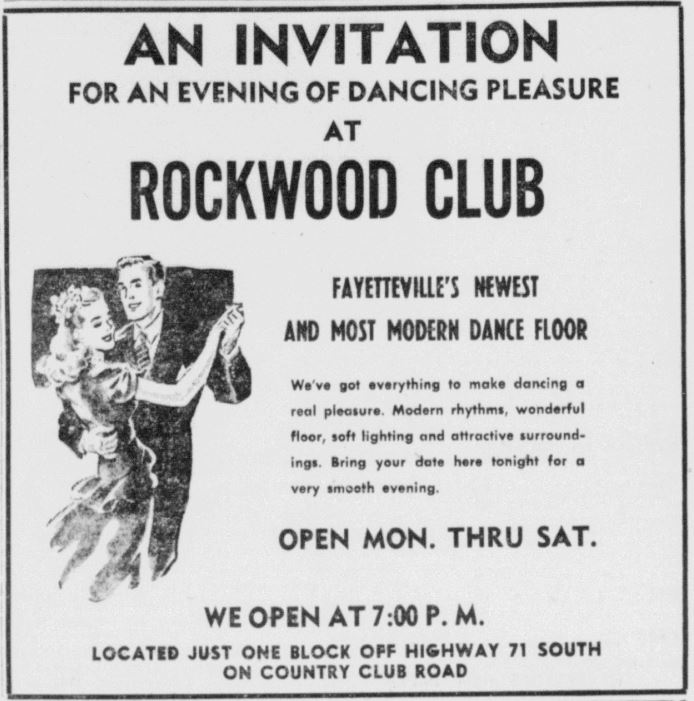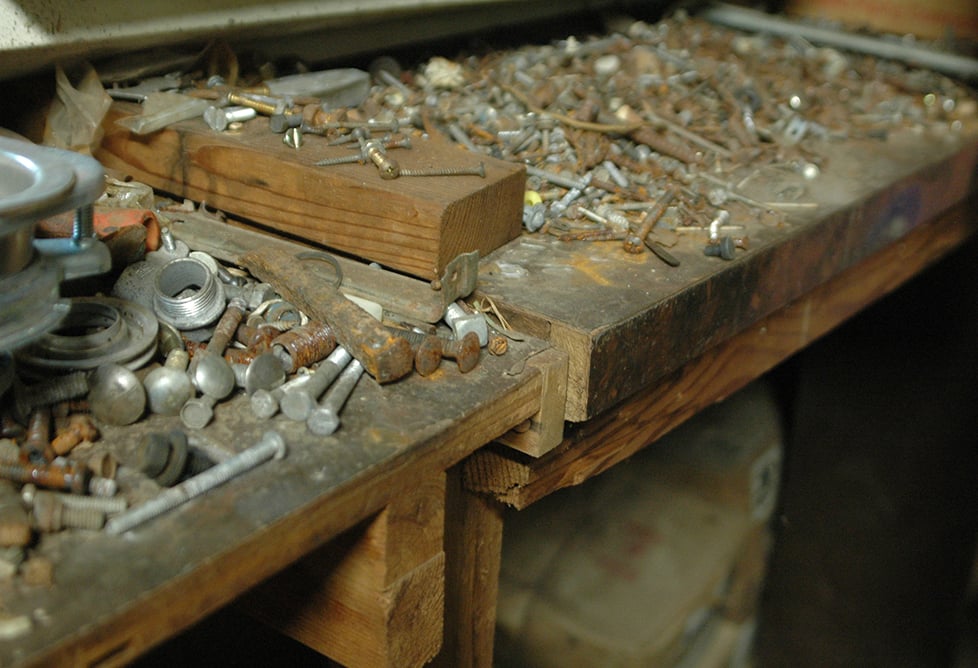
The Rockwood Club, located in south Fayetteville, was an important live music venue, particularly in the early 1960s. It hosted legendary acts such as Jerry Lee Lewis, Conway Twitty, Roy Orbison, Wanda Jackson and also The Hawks, a precursor to The Band. The new owner of the building hopes to restore the property and host live music at the site.
Photo by Dustin Bartholomew
When Mark Risk worked at St. Michael’s Disco Alley as a 21-year-old college kid from Michigan, he didn’t know the history of the building. He was just there for the job, pouring beer for fellow students in the mid-1970s. But he later learned the space in south Fayetteville was an important spot in the early days of rock ‘n’ roll. Now the new owner of the longtime music club – nationally known during its early 1960s heyday as the Rockwood Club – wants to immortalize the stories of the venue so others can learn about it, too.

This is the earliest known advertisement for the Rockwood Club. It was published in 1947, not long after the club’s opening.
Courtesy
Risk purchased the former Rockwood Club location on South 24th Street in Fayetteville at the end of October. While he waits for the previous occupant to move out, he plots the next moves. But the main goal is clear – he wants to keep the rich rockabilly and rock ‘n’ roll history that put Fayetteville’s music scene on the map.
“It’s an incredible story, and it needs to be preserved,” Risk said. “And it’s too cool of a place not to do something about it.”
The building, while long removed from its musical peak, is structurally sound. Risk jumped at the chance to own the place before someone else took possession, perhaps someone who didn’t know the history of the building. Risk and his board of informal advisors would like to see it host music again. Although the scope of his plans remains in flux as he learns more about the space, his initial ideas include having a way to honor bands who have played there in the past with a museum-like element or a wall of honor. Live music that captures the spirit of those who have gone before them would be offered as well. The timeline and costs for such projects are yet to be determined. In the meantime, Risk and his team of volunteers are seeking information about the venue. Journalist and researcher Sandra Cox Birchfield has unearthed several newspaper advertisements from the club’s early days. Earl Cate of the Cate Brothers Band, who played the Rockwood Club with his early band The Del-Rays, has walked through the space to search for clues of former glory, like the location of the original stage. Risk continues to dig for information that will inform his plans, and anyone who remembers the Rockwood Club or has photos of it are invited to contribute to the project. Part of Risk’s motivation to preserve the space and the stories now stems from the fading window to talk to the people who knew it best. Someone going to the club as a college student in the early 1960s would now be nearing 80 years of age.

(Left) In addition to serving as a longtime music venue, the Rockwood Club was at one time called the Rockwood Supper Club and served steak dinners. This room would have housed diners. (Right) A view of the club from 1961. The stairs pictured in the photo to the left are the those at the center of this photo.
Kevin Kinder / Courtesy
The Rockwood Club began in 1947 after its founder, George Lee Lenox, moved his operations outside of Fayetteville city limits when the town annexed the area of College Avenue and Township Street. While Risk has been unable to locate specific building plans, legendary architect Fay Jones claimed his consulting work on the honky tonk was his first paid gig. The new space allowed Lenox to offer a combination of live music, dancing and alcohol. And so it was for decades, earning a reputation as a college hangout that also brought in some of the biggest acts in music. Jerry Lee Lewis played there, as did fellow Rock and Roll Hall of Fame member Wanda Jackson. It also proved formative in the development of The Band, the legendary rock outfit behind songs such as “The Weight” and “Up on Cripple Creek.”
Rockabilly legend Ronnie Hawkins of Huntsville bought the Rockwood Club in the early 1960s, performing there many times and booking influential bands he knew. His backing band, The Hawks, would later ditch their mercurial leader and briefly take the name Levon and The Hawks, using the name of their drummer, Arkansas native Levon Helm. They would soon just go by The Band and were hired to back Bob Dylan during his transition from acoustic to electric performances before breaking away for a successful solo run.

The college hangout evolved several times, from a dance hall to a rockabilly club to a disco joint. The downstairs bar where so many drinks would have been served has since been cluttered as a storage space for a property management company.
Kevin Kinder
The Rockwood Club transitioned to the disco club that Risk worked at in the mid-1970s. It was also briefly a day care. After a bank foreclosure of the space, it became headquarters for a property management company that occupied the space prior to Risk’s purchase.
“This is a legendary place, and it’s just been sitting here for 35 years,” Risk said.
Risk will continue to formalize plans, which he anticipates will solidify as the space clears out. He hopes to hold a fundraiser and information session soon to continue progress on the site. It will likely be a year before the space opens to the public, Risk said.
“It’s going to be an interesting adventure,” Risk said.
Note: Those with information or photos related to the Rockwood Club can contact the venue via email at [email protected].



